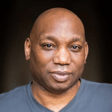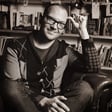
Episode 494: Co-Writing a Memoir, Becoming a Publisher, and Finding the Passion with Jeremy X. Wagner
"As a reader, if I were a fan reading this book, I want the good, the bad and the ugly. I want you to rip the band aid off and tell the truth. Because, from my from my experience, I've read a lot of memoirs that are super boring and just fluff," says Jeremy X. Wagner, co-author of Curtis Duffy's Fireproof: Memoir of a Chef (Dead Sky Publishing).
We have Jeremy X. Wagner on the show today. This dude is a stone-cold badass and the co-author/ghost writer of Fireproof: Memoir of a Chef (Dead Sky Publishing). Jeremy, man, he’s a heavy metal musician and founder of the death metal band Broken Hope.
He’s the author of the novels Rabid Heart, which was nominated for the best horror novel at the 2019 Splatterpunk Awards, and the novel The Armageddon Chord. He has a new novel coming out in January titled Wretch, so stay clued into jeremyxwagner.com for more info on that.
He’s the CEO of the TV/film company Aphotic Media and the indie publishing company Dead Sky Publishing. He has a very varied creative life which I find inspiring and really fucking cool.
In this conversation we talk about:
- How he became an accidental publisher
- Playing guitar
- Being turned on to Ride the Lightning
- Passion and imagination as a driver
- Learning the business inside and out
- Competition
- Trust
- And how he translated Curtis’s voice onto the page
Newsletter: Rage Against the Algorithm
Show notes: brendanomeara.com



















